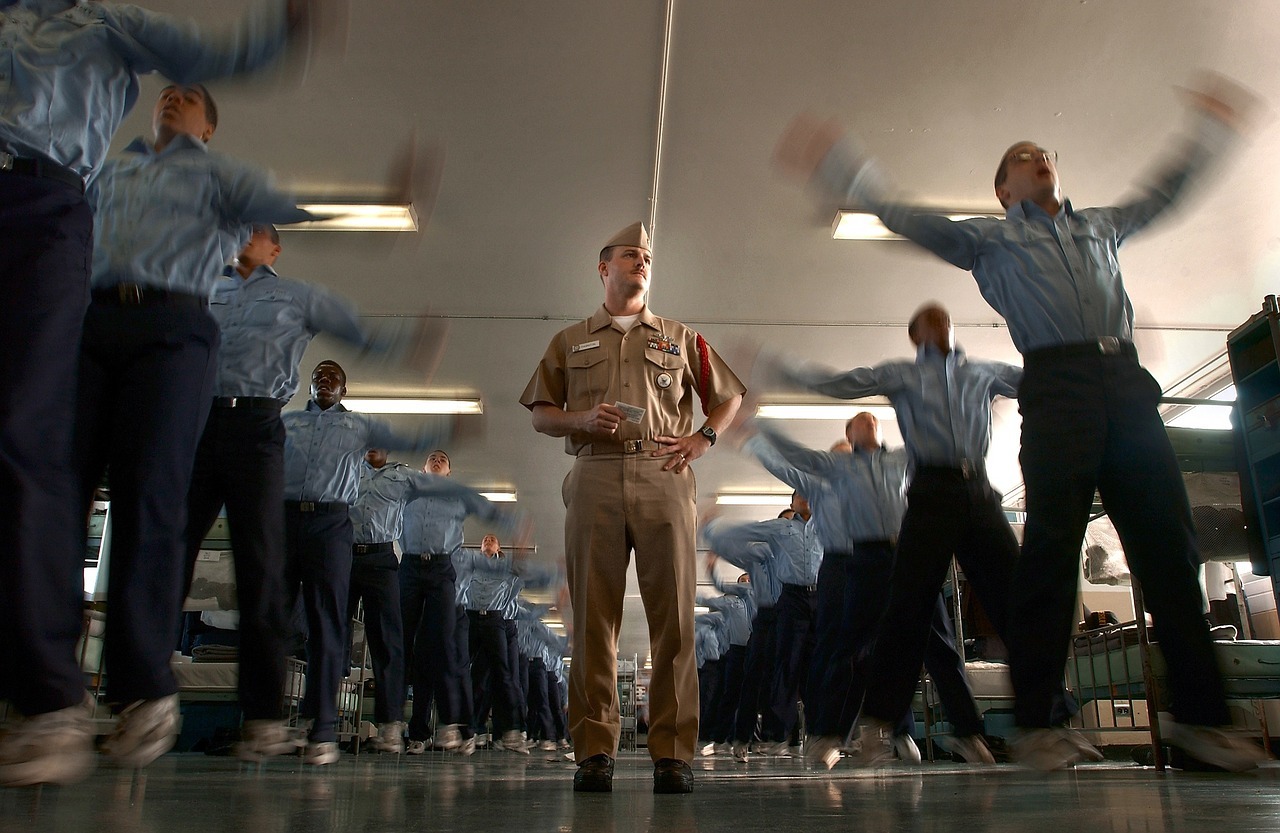How to Be a Great Manager
The importance of spotting: Some people are good at generating ideas. Others collect them. I am a collector myself. I walk around with a ‘mental notepad’ and I make notes of everything interesting I see; I call these mental notes ‘discoveries’. They can be almost anything – perhaps an idea that I had not thought of; or a different way of looking at things; a strange incident which shows something about human nature; or an explanation which helps me make sense of things… It is not quite the same as creating things yourself of course, but I console myself with the words of Dan & Chip Heath: ‘If you are a good spotter, you can always trump a good creator’ (Heath & Heath 2008 – p. 242). Why? Because the world will always produce more original ideas than any single individual can. And as I am not particularly original myself, spotting things is really my only option! J What follows is a series of ‘mental notes’ I made while I was in the army. The source of these discoveries was our Unit Commander. His name was George Philippeos (GP).
Arrival: It was a beautiful day in late summer. Having travelled from the boot camp at Thiva to
Having travelled from the boot camp at Thiva to
Thessaloniiki by train, we got on some military trucks and we were being taken to what was to be our home for the next few months – a military camp in Eleftheroupolis, a small town 15 km off Kavala. With us on the truck was a sergeant – a non-professional NCO. Most of us were feeling somewhat apprehensive as we had all heard ‘horror stories’ about nightmare camps, sadistic officers etc. What the sergeant said next went a long way towards alleviating our fears: ‘The camp is an old one’ he said ‘don’t expect much in terms of comforts; but on the plus side, you have the best commander in the entire Greek Army!’ And he meant it too.
Reputation: Reputation is hugely important because it creates expectations. Expectations colour our perception of experiences. In an amazing study, Professor Ariely added a little balsamic vinegar to beer and offered it to students. When they did not know it, they loved it; when they did, they preferred the ordinary kind! (Ariely 2008 – p. 159). Other studies have shown that we interpret new information in the light of what we know (Saad 2011 – p. 189). If we are positively predisposed towards someone we tend to look for evidence confirming our positive view and disregard everything else (Confirmation Bias!).
The phonecalls: Having arrived at the Unit we were allowed a few hours to settle in and then we were gathered together in a large hall, where our commander (GP) addressed us. He spoke in a friendly way, telling us a few things about how things worked and then he suddenly smiled and asked us a tricky question: ‘You have been here for a few hours… How many of you have called your parents to tell them you have arrived safely?’ Some people put their hands up. ‘And how many of you have called their girlfriends?’ Even more did so. ‘Now – how many of you called their girlfriend and asked her to call their parents to tell them everything is ok?’ I am ashamed to admit that I was among those who raised their hands… ‘What??’ he said in a mock-angry way ‘Go to my office NOW and call your parents – don’t worry about the cost…’
Reciprocity: The reciprocity norm is one of the human universals (Brown 1991). It is found in all cultures and it is extremely potent. Research has shown that if someone does someone else a favour the latter feels duty bound to reciprocate, regardless of how much they like the former (Regan 1971). In offering us free phonecalls, GP effectively activated this mechanism – we felt obliged towards him in some way. NB: Reciprocity is not the same as rewards; in fact it is far more potent because it activates a moral centre. However, for the mechanism to work effectively, it is crucial that the initiator has to offer something first and do it unconditionally (Goldstein, Martin & Cialdini 2007 – p. 40).
Hazing: Once we had returned he continued casually: ‘…You may have heard stories about ‘old hands’  giving new recruits a hard time. Such rumours are actually grossly inflated and we have never had any such incidents here. But just in case anyone should think that such an idea might be good fun, I would like to make it clear that the first person to be reported to me for hazing will be court-martialled…’
giving new recruits a hard time. Such rumours are actually grossly inflated and we have never had any such incidents here. But just in case anyone should think that such an idea might be good fun, I would like to make it clear that the first person to be reported to me for hazing will be court-martialled…’
Public commitment: Commitments made in public are very binding and people realise it subconsciously. Once you have made such a public statement you cannot very well go back because that would mean loss of face (cf Goffman 1990) – the more so if you happen to be a politician – manager – commander. GP had a reputation for being tolerant and for his ‘Paternalistic Leadership’ style (Northouse 2009) and some soldiers might have thought they could get away with minor misdemeanours. Hazing and bullying however are a particularly serious issue, so by committing himself to a course of action in advance, he effectively nipped such a problem in the bud! Excellent!
Rip-off: A few days later I heard the following story: The unit had arrived from Giannitsa a few months previously. Naturally, an army camp in the area is often very good news for a small town like Eleftheroupolis as it means more business for the locals. However, it soon became obvious that prices in this small town were grossly inflated. A cup of coffee cost 50% more than in Kavala (a popular sea-side resort a few miles away)! This was reported to GP, who then paid a visit to the Mayor. Apparently here is the gist of what he told him: ‘Listen – at present I’ve got about 120 soldiers and around 90 vehicles. Kavala is only 15 km away. It is the easiest thing in the world for me to get 3 trucks to take people who are off-duty to Kavala for the evening and bring them back later. And I can do this on a daily basis.’ Prices went back to normal.
Liking: According to Cialdini we instinctively warm to people who are ‘on our side’ (Cialdini 2001). He gives a fascinating case study of a waiter who made a huge amount from tips by actually telling people that a particular dish they had ordered was not up to the usual standard that day and recommending a cheaper one instead! (ibid – p. 160) This is harder to achieve for people in authority, but if people know you are sincere, it can work wonders (remember Mr Keating in ‘The Dead Poets’ Society’?) By doing such a thing GP demonstrated his care for his soldiers – and the effect was exacerbated by the fact that he did so unprompted and not in response to complaints!
Five days’ leave: There was a young boy among us who often worked in the kitchen. One day a signal came through that his mother had fallen down, broken her leg and was in hospital. As soon as he heard of it, GP left his office and went to see him in the kitchen where he found him scrubbing trays, his arms all covered in soap-suds. ‘Listen’ GP told him ‘I heard your mother is in hospital. She is ok, but she appears to have broken her leg. Now – I would like you to leave everything as it is, go to the barracks, change into your civilian clothes and go visit her. You have five days – on top of the leave you are entitled to’.
Details: Details matter – a lot! Notice the following little things: a) GP did not wait for the soldier to ask him – his was an unsolicited offer; b) very importantly, he went to find him in person. He did not send someone to tell him and he did not summon him; instead he went to the kitchen himself. Anthropologist Boehm who has studied hunter-gatherer bands says humans have a strong egalitarian instinct (Boehm 2001) We are quite prepared to follow a competent leader but we do not like it when they put on airs and pretend to be different from us. The greatest generals of all time have always made a point of eating the same food as their soldiers, marching on foot with them and sharing in their hardships. The other implicit message in this gesture is as simple as it is potent: ‘You are not just any soldier – you matter to me as an individual’.
Punishment: On another occasion two of the ‘old hands’ had a ‘minor disagreement’ and ended up exchanging blows. This is a very serious offence in the army and the standard punishment is 40 days ‘jail time’. (That means no leave and you may need to serve extra time!) The two had to appear on ‘Defaulters’ the next day in front of the whole unit. In his usual, calm voice GP told them off for being stupid, all the more so since they would be rejoining civilian life soon. After this tirade, the time came for the ‘sentence’: ‘OK’ he said ‘Today you are both off duty. You, the tall guy – you have longer arms and you gave him a black eye; now you have to buy him a beer. This is your punishment’. When the rest of us had managed to persuade our lower jaws to move up from our chest and resume their proper place, he continued ‘And lest it be thought that the same thing is going to happen again in the future, I just want to make it clear that the next person to do such a thing gets 40 days – is this clear???’ As his tone had assumed a steely tone at the end, I’ll leave it to you to guess our answer…
exchanging blows. This is a very serious offence in the army and the standard punishment is 40 days ‘jail time’. (That means no leave and you may need to serve extra time!) The two had to appear on ‘Defaulters’ the next day in front of the whole unit. In his usual, calm voice GP told them off for being stupid, all the more so since they would be rejoining civilian life soon. After this tirade, the time came for the ‘sentence’: ‘OK’ he said ‘Today you are both off duty. You, the tall guy – you have longer arms and you gave him a black eye; now you have to buy him a beer. This is your punishment’. When the rest of us had managed to persuade our lower jaws to move up from our chest and resume their proper place, he continued ‘And lest it be thought that the same thing is going to happen again in the future, I just want to make it clear that the next person to do such a thing gets 40 days – is this clear???’ As his tone had assumed a steely tone at the end, I’ll leave it to you to guess our answer…
Incongruity: Such unfortunate incidents represent threats – here, a threat to discipline and to GP’s image as a tolerant commander (as he would have to hand down a punishment). If he simply gave them a ‘suspended sentence’ he might appear weak. Instead, GP turned this threat into an opportunity! The key here is incongruity. The human brain is often on ‘auto-pilot’ and we fail to notice things we expect; yet something that shatters our expectations often wakes us up with a jolt! Dutton (2010 pp. 227-239) stresses how incongruity can be hugely effective in inducing compliance. In this case, at one stroke GP diffused the tension, bolstered his reputation and (because of the public commitment [see above]) ensured that such a thing never happened again. Brilliant!!
Feedback: Later on I was transferred to the Artillery School in Athens, and as luck would have it, GP was also transferred there a few months later. On my last day, he sought me out. ‘Well’ he said, ‘this is it. As of tomorrow you’ll be a civilian.’ He smiled ‘I can neither punish you in any way nor give you any extra days’ leave. So – tell me now: What did you think of life at the Unit? What did you like/dislike? What did you think of the officers there?’ So I told him.
The illusion of knowledge: One of the most intriguing findings of Psychology is that of ‘The Illusion of Knowledge’ (Chabris & Simons 2010 – Ch. 4) Simply put we all think we know a lot more than we actually do – and this applies to experts as well as ordinary people. Politicians think they have their finger on the pulse of the nation, economists think they know how the markets are going to respond and we teachers of course think we know how our students think and feel (and what they have learned). Only very often we are wrong. Which is why wise leaders try to keep their eyes and ears open – and why seeking feedback is so important. As an added bonus, it makes the people asked feel valued.
Success: How does one know whether they have been successful as a manager / leader? * Little things can give us a clue – here is one… I was driving back to camp one day and I was speeding when I heard a siren behind me. It was a traffic policeman and he signalled to me to pull over. ‘Just my luck!’ I thought… He showed me the speed gun – it read 120 km/h and the speed-limit was 70… That was serious; not only would I face a stiff fine, but I would have to appear in court! My heart sank – it was not the fine; if there was a trial GP would hear of it and he would be so disappointed… One of the things he kept lecturing us about was how dangerous speeding was… So I explained this to the officer and then I asked him shame-facedly: ‘Can we not say I was doing 90? In that case I would only pay the fine…’ The officer smiled and gave me a ticket. I am sure were GP were to hear of it he would be smiling too…
* Cialdini (2001 – p. 36) gives the case study of a female employee who (get this!) wanted to leave her job to get another one with better prospects, but she stayed in her post nevertheless waiting for her manager to retire because she would have thought it disloyal on her part to leave while he was still there!! I am absolutely certain that if GP had asked us to serve a month extra most soldiers would have said ‘yes’!
[jbox title=”References”]
- Ariely, D. “Predictably Irrational” HarperCollins 2008
- Boehm, C. “Hierarchy in the Forest: The Evolution of Egalitarian Behaviour” Harvard University Press 2001
- Brown, D. “Human Universals” McGraw-Hill 1991
- Chabris, C. & Simons, D. “The Invisible Gorilla” Harper Collins 2010
- Cialdini, R. “Influence – Science and Practice”, Allyn & Bacon 2001
- Dutton, K. “Flipnosis” Random House 2010
- Goffman, E. “The Presentation of Self in Everyday Life” Penguin 1990
- Goldstein, N., Martin, S. & Cialdini, R. “Yes! 50 secrets from the science of persuasion” Profile Books 2007
- Heath, C. & Heath, D. “Made to Stick” Random House 2008
- Northouse, P. “Leadership: Theory and Practice” Sage Publications 2009
- Regan, D. (1971) “Effects of Favour and Liking on Compliance” Journal of Experimental Social Psychology, 7, 627-639
- Saad, G. “The Consuming Instinct” Prometheus Books 2011
[/jbox]



